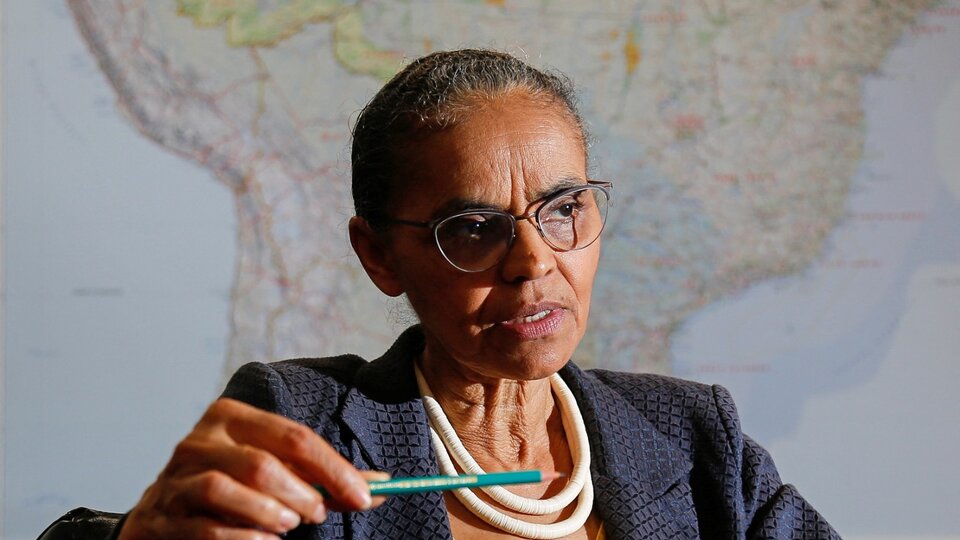The new Brazilian Environment Minister, Marina Silva, declared after her first month in office that the environmental reality in her country is “much worse” than expected. And that to recover what was lost and protect the Amazon, she will need more international support.
Despite the challenge, the environmentalist with four decades of experience feels “grateful” to return together with President Luiz Inácio Lula da Silva at the head of this Ministry, which she already held between 2003 and 2008, fighting against deforestation.
Marina Silva took office on January 1, after four years in which the government of the far-right Jair Bolsonaro was internationally repudiated and accused of leaving the field open to deforest the Amazon for the benefit of agribusiness.
“The reality is much worse than we expected, because here we had a blackout,” Silva said in an interview with AFP: “The effort will not be small, because the dismantling (in the Ministry) that we have had in these four years has been very great”.
His ministry was now renamed Environment and Climate Change, in tune with the times. And she maintained the minister that the change is not cosmetic: “it places the environmental agenda at the highest level of government priority. That is a change that is compatible with what is happening in the world.”
The goal of zero deforestation for 2030 is a symbol of that commitment, Silva commented: “it will not be an easy path (…) But we are going to try to make up for lost time.”
A transversal vision
The minister explained that the plan against deforestation is being restored, after the almost paralysis of the Bolsonaro administration. And she added that the Lula government wants environmental policies to be dealt with by 17 ministries.
Silva did not advance numerical goals, but insisted that they will not give a truce to illegal deforestation: “we want to convince people that destroying the forest is not a good business (…) (…) we are going to invest in biotechnology, tourism , low carbon agriculture and other sources of income generation.
“Our goal is that with this joint work, we can contribute to regain control of actions to prevent and combat deforestation, and work hard on territorial planning,” said Marina Silva. And he explained that most of the deforestation occurs on public lands and spaces demarcated as “environmental conservation units” and “indigenous lands.” For this reason, in the first 100 days of the government, new conservation units and indigenous lands must be announced.
Silva clarified that he does not promise a sustainable Brazil in four years of management: “we are going to do what is possible in a short space of time. Only populist governments can say that they solve problems of this magnitude in four years (…) we hope to arrive to COP30 in 2025 as a country that is doing its homework,” he said, referring to the UN climate conference.
a vote of confidence
Marina Silva is 64 years old and has just participated in the Davos Forum, in which she says she received a warm reception: “people feel that Brazil is back: it was like an extension of the reception of the election of President Lula, which is given for what we did; we managed to reduce deforestation by 83 percent for almost a decade during Lula’s first governments.”
These marks, Silva observed, allow him to start his tenure with an international vote of confidence. “We know that from now on we will need to gain confidence for what we are going to do”. But for this former presidential candidate, who forged a career from her native Breu Velho (Acre) in the heart of the Amazon, Brazil cannot perform miracles without international help.
In economic matters, he welcomed the activation and expansion of the Amazon Fund -its main donors are Germany and Norway- which was paralyzed during part of the Bolsonaro administration due to disagreements over the destination of the resources: “we are talking with the United Kingdom, France, Spain, with all the countries to contribute resources to the Amazon Fund. We don’t want it to be just Germany and Norway.”
Developed countries will have to cooperate
In addition to governments, the minister maintained that the talks are advancing with companies and philanthropists. But Silva expects more than resources: “this collaboration with developed countries, which is also the opening of markets for our sustainable products (…) That what is produced legally can be a source of income generation, because the Amazon has 25 million people“.
“We have the great challenge of moving towards a sustainable development model that guarantees that these people can live with dignity,” said Silva, who also stressed that the commitment against the sale of illegal gold and timber must be multilateral. And he added that he expects contributions on other fronts: “If developed countries do not reduce their carbon dioxide emissions, the Amazon will be equally destroyed.”

